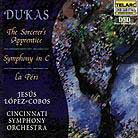February 2000
All kidding aside, even if he wasn’t quite a one-hit wonder on the surface, it seems that Dukas wasn’t a very prolific composer either. When you mention Dukas, the piece lifted by Disney is likely all that comes to mind. This is not helped by the fact that not many of his other works survive -- he destroyed all his unpublished compositions shortly before his death and left behind only a fragment of his life’s oeuvre. One opera, one ballet, a few tone poems, some piano works, and few other chamber pieces are all that remain. Two of his best orchestral compositions appear on this CD, but also included is his infamous symphonic poem. One is surely familiar (tired of?) The Sorcerer’s Apprentice, but I guess it has been included if only to induce the newcomer into purchasing the CD. This piece is a double-edged sword -- for if it weren’t for this "joke," as Dukas once described it, his other works may have never been performed other than during his lifetime. This CD is evidence M. Dukas was far a better composer than this small-scale work suggests. The CD starts out with the its brief Fanfare, then the complete ballet score to La Peri. This is Dukas’ last published work and my favorite track on the CD. It is a fine impressionistic/romantic amalgam, a bit more French than European, but with many elements that are recognizable to both schools. To be perfectly honest, at first listen it was tough for me to listen to this music without wondering what could have become of it if Dukas were just a bit more adventurous with his orchestration (or if Dukas were high(er) on absinthe). After a few listenings I came to appreciate it more. It holds up remarkably well next to work of the other more famous French composers of the turn of the century -- even if it is not nearly as modern (or as absorbing) as compositions by Dukas' friend Claude Debussy. Next up is The Sorcerer’s Apprentice, which I only listened to the first few minutes of before moving on to the next track. OK, you might be disappointed in me for not listening to this CD en toto, but I just couldn’t bear it. Closing the CD is his three-movement Symphony in C. The version I’m most familiar with is from an LP with the London Philharmonic conducted by Walter Weller [London CS6995, also available as Decca SXL SXL6770 ]. I’m often accused of preferring versions on vinyl just in principle, but there is not much to back up that argument here. The Cincinnati SO responds wonderfully to Lopez-Cobos -- the Symphony is both played and conducted just as convincingly, perhaps more so. In addition, the engineers from Telarc should also be commended; it is partly because of them that this CD spent longer in my player than for just the review period. All the sections of the orchestra can be clearly heard without ever sounding too detailed, and the soloists are never unnaturally highlighted. This contributes to the very listenable, non-fatiguing sound throughout the entire program. The frequency extremes are first rate -- the bass is weighty without exaggeration, and highs are natural. Still, the sound quality is not quite as good as it is on Lopez-Cobos’ version of Mahler’s Ninth Symphony [Telarc CD 80426] (which if you haven’t acquired by now, shame on you). There is a magnificence to the Mahler recording that places it all but in a class by itself. But I digress. I don’t think I would go as far as to give this CD an unconditional recommendation. But by now there are likely music lovers who have grown tired of the umpteenth release of works from the standard repertory, and others who might not be able to (or even want to) understand fully the more adventurous twentieth-century inventions. To either, this CD might be a welcome addition. GO BACK TO: |
 Dukas - The Sorcerer's Apprentice, Symphony in C, La Peri
Dukas - The Sorcerer's Apprentice, Symphony in C, La Peri![[Reviewed on CD]](../format/regcd.gif) To the best of my knowledge there are currently seven CDs in print that
exclusively feature Paul Dukas’ works. Of these, two are of his piano music. Four of
the other five contain the smash hit that he wrote in 1940 for Walt Disney, The Sorcerer’s
Apprentice. What’s that? He wrote it in 1897? Dukas died in 1935? You mean he didn’t
write it for Fantasia?
To the best of my knowledge there are currently seven CDs in print that
exclusively feature Paul Dukas’ works. Of these, two are of his piano music. Four of
the other five contain the smash hit that he wrote in 1940 for Walt Disney, The Sorcerer’s
Apprentice. What’s that? He wrote it in 1897? Dukas died in 1935? You mean he didn’t
write it for Fantasia?